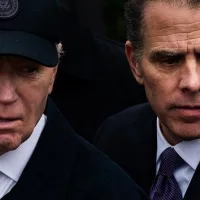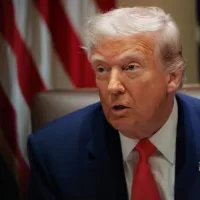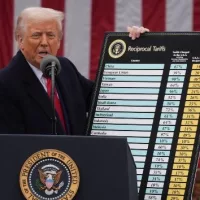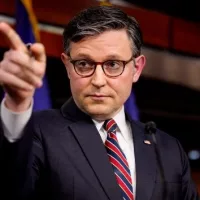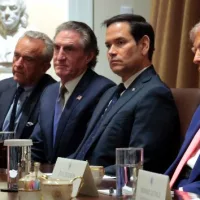
(WASHINGTON) — Far as he was from Washington, D.C., as Health and Human Services Secretary Robert F. Kennedy Jr. hiked to the top of a towering sandstone arch in rural Arizona with a group of Navajo Nation leaders, the impact of his agency’s cuts reached farther.
Wearing a shirt with a clear request written on the front, “Save IHS Jobs and Diabetes Program,” a Navajo council delegate, Eugenia Charles-Newton, approached Kennedy to tell him she was concerned HHS cuts were impacting the diabetes program that she relied on for care.
Charles-Newton said she’d heard funding wasn’t being renewed for aspects of the Special Diabetes Program for Indians, a program within Indian Health Services (IHS) at HHS. The rapid restructuring at HHS had made it difficult to track the actual impact, she said.
Kennedy, who listened and then walked arm-in-arm with Charles-Newton for the last leg of the hike, promised to look into the program and whether any funding was being impacted by the HHS-wide restructuring. The improvements to Navajo health care that she was asking for seemed like “common sense,” he said.
The president of Navajo Nation, Buu Nygren, also mentioned an impacted program — the Low-Income Home Energy Assistance Program, or LIHEAP, which provides federally funded assistance to reduce utility bills and help with weatherizing homes. Navajo people — living with the extreme temperatures of the desert — relied heavily on its assistance, he said.
But the program was gutted by HHS cuts. Nygren told ABC News he held out hope that Kennedy, made aware of its importance to Navajo Nation, might consider reinstating it.
From the start of the layoffs, Kennedy has insisted that no “essential services” would be cut. “The cuts in all of our agency are not affecting science,” Kennedy told ABC News last week.
But the scope of the cuts — and the work impacted, from utility bill assistance on Navajo Nation, to research into black lung disease for coal miners, to a division that monitors lead exposure among children — has continued to dog Kennedy, raising questions about his oversight and involvement in the major restructuring.
In all, the tribal leaders were resoundingly appreciative of Kennedy’s visit, which was part of his first major trip as HHS secretary. The trip focused on combatting chronic disease, with a heavy emphasis on the importance of healthy, unprocessed foods.
Dubbed the Make America Healthy Again tour, Kennedy also visited Utah, the first state in the nation to pass a law to remove fluoride from drinking water systems, and met with local officials. While there, he toured the Osher Center for Integrative Health at the University of Utah, which is aiming to center healthy diet and exercise in the health care conversation, and got aboard their “food pharmacy,” which delivers prescribed healthy foods to patients.
In Arizona, which passed a law to ban SNAP recipients from using the assistance for soda, Kennedy held a press conference with the legislators who championed the bill and toured a Phoenix health center that offers healthy cooking programs for local native communities. He also stopped in for a panel discussion at the 2025 Tribal Self-Governance Conference, sitting with tribal leaders including the chairwoman of the Wampanoag Tribe, which he fondly described spending time around during his childhood in Massachussetts.
On Navajo Nation, the crowd that gathered at the foot of Window Rock, a memorial, commended him for his devoted attention to issues of outdated medical centers, lack of water infrastructure and inadequate access to healthy foods.
“Processed food hurts all of us. It disproportionately injures Native people,” Kennedy told the group of Navajo leaders, who nodded in agreement.
But they also used the opportunity to tell Kennedy that they needed more support, not less — warning against the impact of his agency’s cuts. It was a conversation that Kennedy was receptive to.
“We are all going back with a long laundry list of tasks that we need to perform. And I’m going to give you my commitment today that I am available and listening to you,” Kennedy said.
In an interview with CBS News that aired on Wednesday, Kennedy struck a similar tone to what he told the tribal leaders on Navajo Nation — that he would look into cuts that he wasn’t aware of, and reinstate those that had disrupted “scientific research.”
“There’s a number of studies that were cut that came to our attention and that did not deserve to be cut, and we reinstated them. Our purpose is not to reduce any level of scientific research, that’s important,” Kennedy said in an interview with CBS News on Wednesday.
Kennedy’s comments come after he also told ABC News last week that studies and personnel were being reinstated, adding that the plan was always to make large cuts and then “remedy” mistakes.
But government officials later walked back those comments — and have largely stood by the cuts, which hit nearly one-fifth of the workforce at both the Centers for Disease Control and Prevention and the Food and Drug Administration.
On Wednesday, HHS did not respond to a request from ABC News for clarity on which research studies Kennedy was referring to in his interview with CBS News, and whether they had been reinstated.
Asked about various cuts in the CBS interview, from a grant for diabetes research at the University of Michigan to over $11 billion in cuts to COVID recovery efforts at the state level, Kennedy said he wasn’t “familiar,” but would look into it.
Across the CDC, FDA and the National Institute of Health, three of the main public health arms of HHS, there have not been significant changes to the cuts that hit around 10,000 employees last week.
Copyright © 2025, ABC Audio. All rights reserved.






